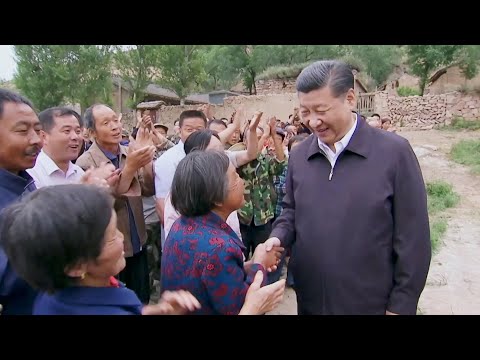BEIJING, June 16, 2024 /PRNewswire/ — Fifty-five years ago, a 15-year-old Xi Jinping, as an “educated youth,” went to Liangjiahe Village in northwest China’s Shaanxi Province. He later spent seven years in the countryside, working and living alongside farmers.
Those years helped foster his unchanging belief in doing practical things for the people, Xi recalled.
After being elected general secretary of the Communist Party of China (CPC) Central Committee in November 2012, he pledged his continuous dedication to serving the people. “The people’s wish for a happy life is our mission.”
From a rural Party branch secretary to the general secretary of the CPC Central Committee, Chinese president and chairman of the Central Military Commission, Xi Jinping always has the country in mind and sees himself as the people’s servant.
Man of the people
Xi arrived in Liangjiahe as a slightly bewildered teenager and left as a 22-year-old man determined to serve the people.
He later went to Zhengding, a poor county in north China’s Hebei Province. Li Yaping, then a Zhengding County official, recalled that Xi said China had many things waiting to be done and needed some people to shoulder responsibility.
From his early years, Xi seemed uninterested in the trappings of offices. He would travel for days, sometimes into the mountains, to talk with people at the grassroots, learn about their difficulties, and help solve their problems.
In Zhengding, Xi rode an old bicycle all over the county and noticed that the annual grain procurement quota of 38 million kilograms by the state had left local people hungry.
He wrote to the CPC Central Committee, suggesting local farmers’ difficulties were caused by the high procurement quota. After the investigation team learned about the situation, they reduced the quota from 38 million kilograms to 24 million kilograms.
Cheng Baohuai, then secretary of Zhengding County CPC Committee, recalled that people appreciated Xi’s work, saying they finally had enough food. Xi really rooted himself in the people and took to heart the hardships of the people, Cheng said.
‘For the good of my people’
Since the 18th CPC National Congress in 2012, Xi has made over 100 visits at the grassroots level, including to both urban and rural areas.
He voiced concerns about the food markets’ holiday supply sufficiency, residents’ access to medical care and migrant workers’ pay. Addressing people’s pressing needs is on the agenda of the central authorities and has become the driving force behind reforms.
“We are now practicing a people-centered development philosophy,” Xi said during a symposium on eradicating extreme poverty on June 23, 2017. “People-centered development must focus on what the people need most.”
Under Xi’s leadership, China has witnessed historic changes, with absolute poverty wiped out and moderate prosperity attained for the country’s 1.4 billion people.
China’s per capita disposable income in 2023, for instance, increased by 6.1 percent year on year, and the income gap between urban and rural residents continued to narrow. The gains of poverty elimination were consolidated and expanded, with per capita income in rural areas that have been lifted out of poverty growing by 8.4 percent last year.
“Chinese modernization aims to ensure that development is for the people and by the people and that its fruits are shared by the people,” Xi said at a seminar in February 2023.
Asked about his feelings on being elected president of China during a visit to Italy, Xi acknowledged the huge responsibility and arduous task to govern such a big country, but expressed his devotion to China’s development.
“For the good of my people, I will put aside my own well-being,” Xi said.


